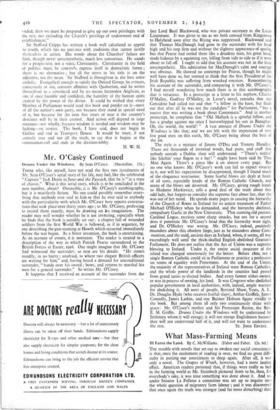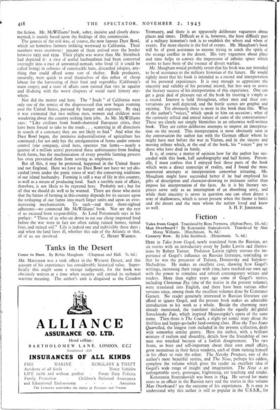What Mass-Farming Means
Ill Fares the Land. By C. McWilliams. (Faber and Faber. 12s. 6d.)
THE trouble with novels that set out to awaken our social consciences is that, once the excitement of reading is over, we find no great diffi- culty in putting our consciences to sleep again. After all, it was only a novel. The Grapes of Wrath, however, had a more lasting effect. American readers protested that, if things were really as bad in the farming world as Mr. Steinbeck pictured them to be, then, for everybody's sake, it was time something was done about it. And so, under Senator La Follette a committee was set up to inquire into the whole question of migratory farm labour ; and it was discovered that once again the truth was stranger (and far more disturbing) than
the fiction. Mr. McWilliams' book, sober, incisive and closely docu- mented, is mainly based upon the findings of this commission.
The genesis of the evil was, of course, the now famous Dust Bowl, which set homeless farmers trekking westward to California. Their numbers were enormous : 350,000 of them arrived over the border between 1935 and 1939. Their plight was worse than Mr. Steinbeck had depicted it : a race of useful husbandmen had been converted overnight into a race of unwanted nomads who lived (if it could be called living) in colonies of ramshackle huts, discarded jalopies, any- thing that could afford some sort of shelter. Bulk producers, naturally, were quick to avail themselves of this influx of cheap labour for the harvesting of their fruit and vegetables (California's main crops); and a state of affairs soon existed that vies in squalor and ill-doing with the worst chapters of social rural history any- where.
Nor did the matter end here. The " Joads " of California were only one of the armies of the dispossessed that now began roaming over the United States, pursued by hunger and exposure. By 1943 it was estimated that two million men, women and children were wandering about the country seeking farm jobs. As Mr. McWilliams says : "Like civilians from bomb-shattered European cities, they have been forced to take to the roads . . . scattering in all directions in search of a sanctuary they are not likely to find." And what the Dust Bowl began, the intensive industrialisation of agriculture has continued ; for not only has the amalgamation of farms under remote control (one company, cited here, operates 70o farms —nearly a quarter of a million acres) prevented these unfortunates from finding fresh farms, but the mechanisation of- every possible farming process has even prevented them from serving as employees.
But all this, it may be protested, happened in the United States and not England. Here we have no Dust Bowl nor have we yet dis- carded (even under the panic stress of war) the conserving traditions of our island husbandry. Farming is still a way of life in this country, as well as a means of producing food. Such a terrible state of affairs, therefore, is not likely to be repeated here. Probably not ; but for all that we should do well to be warned. There are those who insist that the future of farming in this country depends for its success upon the reshaping of our farms into much larger units and upon an ever- increasing mechanisation. To such—and their short-sighted adherents—we commend Mr. McWilliams' book. Nor are the rest of us excused from responsibility. As Lord Portsmouth says in his preface : " Those of us who sat down to eat our cheap imported food before the war were in fact too often eating ruined homes, ruined lives, and ruined soil." Life is indeed one and indivisible these days ; and when the land fares ill, whether this side of the Atlantic or that,































 Previous page
Previous page